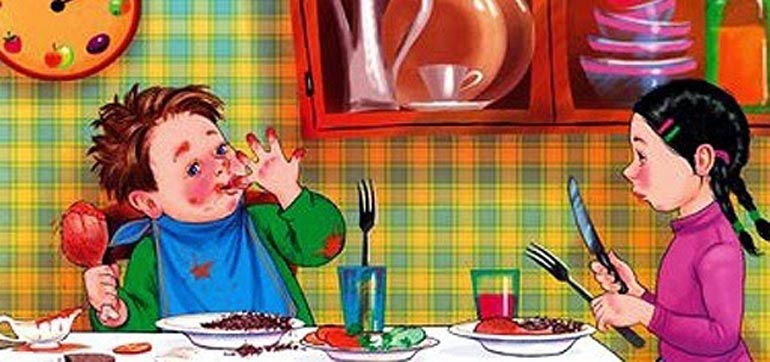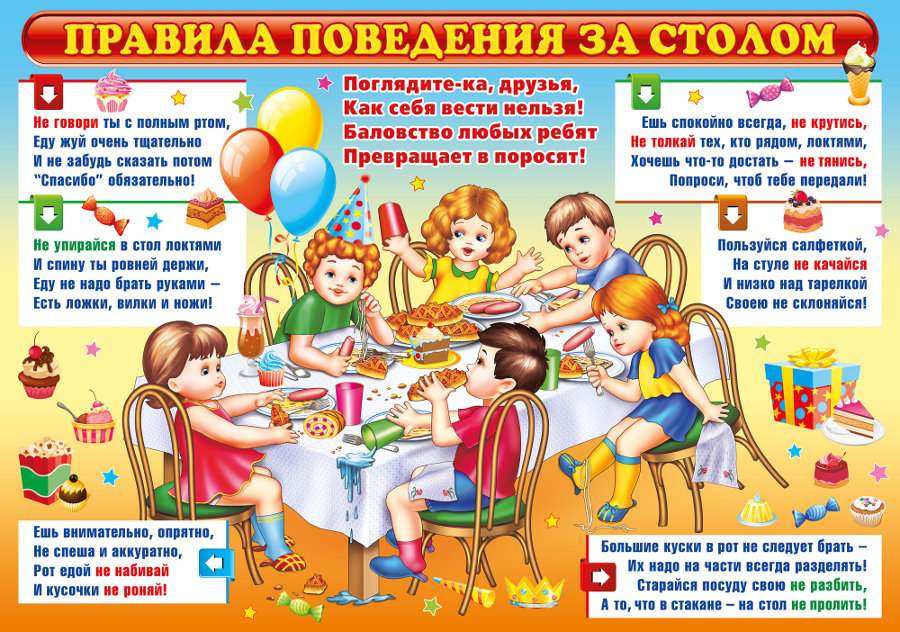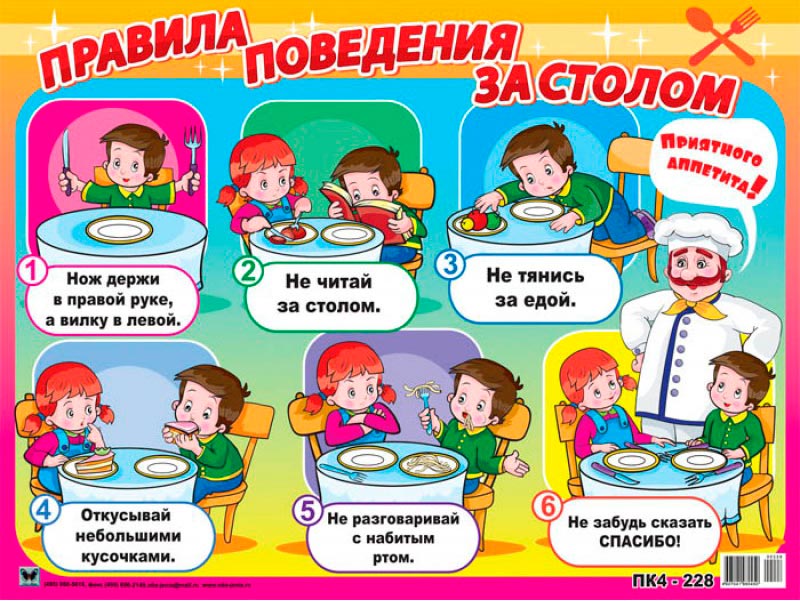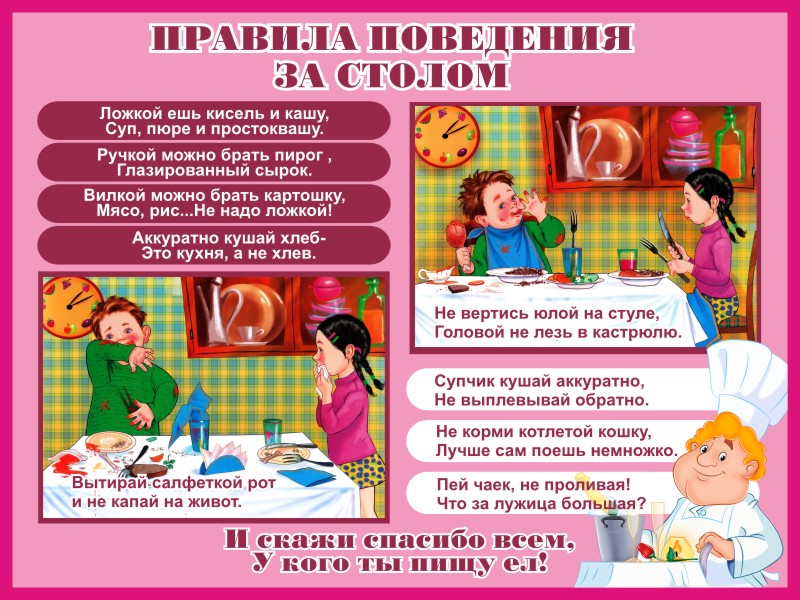Young parents are not always serious about the advice of the elders in raising children, and already teaching their baby the rules of behavior at the table is considered the tenth thing. So it comes down in some families to completely non-pedagogical shouts: “Don’t champ, shut your mouth and chew, sit up straight, don’t swing on a chair, don’t grab from the table until dinner ...”. On this they consider their mission completed. And grandmother knows for sure that in a few years, parents will have to blush for such undergrowth. Or another situation, the baby has been picking soup for half an hour, picks what he likes best from there, and as a result pushes the plate, spilling the contents on the floor, on the table and on himself ... Is this a familiar situation? Forgiven if the child is only one year old. And if it's already four or five? Where is the line between childish embarrassment and lack of good manners? And when do you need to start introducing the child to the basics of etiquette? Let's see what should be the rules of conduct for children at the table.

Each one has several unpleasant moments in his memory when a neighbor's teenager or a kid invited to a children's party simply frustrated lunch with his behavior. They talked loudly, stretched across the whole table for the best piece of cake, champed, or even choked, without chewing food. The list of unacceptable acts is unlimited.
Let us protect ourselves from the similar behavior of a son or daughter in the future. Let’s try to systematize the training of our crumbs in good manners so that it is not burdensome for them or us. The best age to start training is 1.5 - 2 years. Naturally, at this age, the child will not be able to understand all the rules of adult etiquette. Yes, this is not necessary.
When to learn? Everything has its time
The rules of behavior at the table for babies are slightly different from adult etiquette, as many hyperactive children become little pranksters when eating. Most children learn good manners up to 5 years. But you need to start learning a child as early as 1.5 - 2 years. Of course, there may be exceptions to the rules, but know, the later you start training, the more difficult your lessons will be given to the child.
We are reading an article on how to teach a child to eat independently and accurately - complete instruction for parents
(Clickable image, you can copy and print)
![]() from 1.5 to 5
from 1.5 to 5
- At this age, the child actively masters the skills of the surrounding world. He absorbs everything he sees, tries to imitate adults. It's time to learn the basics of etiquette in a playful way;
- This is a mandatory hand wash before eating. Mom herself must not forget to wash her hands before feeding her baby. Before each meal, she should go to the bathroom with the baby and wash her hands and herself. Over time, he will do this automatically;
- Feeding the child must necessarily occur at the dining table, and not in the nursery and not in front of the TV. In the future, this will help your child take food seriously and respect the work of those who prepare food. Put the baby on a high chair so that he does not peek out from under the table, but feels like an equal member of the family;
- Lay the linen cloth on your lap. The clothes will remain clean even if the child spills soup or tea. In adulthood, having a napkin in a restaurant will not put your child into a stupor;
- Do not allow the child to play with food, crumble bread, smear porridge on the table. Such behavior is not permissible even at 2 years. Try to patiently explain to the baby that it is ugly to behave so that mom is ashamed of him. Mom and Dad never act like that. Of course, the baby will not listen to you the first time;
- Only one rule: never yell at him. Be patient and consistent in your requirements. One cannot forbid something today, and tomorrow one cannot notice what the child created;
- By the age of five, children should already be able to handle a fork and knife while they are still children. They should not confuse that the knife should be held in the right, and the fork in the left hand. By this age, a child needs to be taught which foods to eat with the help of appliances and which ones to take with their hands.
![]() from 5 to 10
from 5 to 10
The most fruitful age for education, but also the most difficult. During this period, the child does not so unconditionally trust the words of the parents. He already independently tries to understand the life and actions of the people around him.
Mom and Dad should not allow any indulgence for themselves in the ritual of eating. If you teach your child not to drink juices from the bag, but be sure to pour them into a glass, it will not be acceptable to violate this rule yourself. Or just one day forget to wash your hands before dinner. Or do not thank the hostess for lunch. The child will notice this, and your words for him will no longer be true.
(Clickable image, you can copy and print)
At 5 - 6 years old, the baby must learn how to behave at the table and no longer violate accepted standards. Each violation must be spoken to with the child at the family council. This will help him understand the seriousness of adult demands. But in no case should one conduct a “debriefing” in the presence of strangers, in a derogatory form or with the help of screams and abuse.
[sc: rsa]
- The kid already knows that you need to sit at the dinner table directly, without swaying in the chair. It is unacceptable to place your elbows and push their neighbors on the table. If it is difficult to enforce this rule in words, the reception with books helps a lot. During lunch, slip the armpit of the child under the book and ask them to hold them until the end of the meal. A few of these exercises, and problems with the elbows will not be;
- The child does not allow himself to slurp loudly, speak with his mouth full. This was incited to him constantly. He also knows that in his mouth you need to put small pieces of food and chew them thoroughly;
- The kid holds back burping and coughing. If this is not possible, he must turn away from the table and cover his mouth with a paper towel;
- It will be completely natural for a child under 10 to know that one cannot consider himself the center of society and draw various attention to his person with various high-profile requirements. If the baby needs to move away from the table, he must ask permission from one of the parents in a quiet voice, calmly. It is not necessary for everyone to know what he wants in the toilet;
- You can’t reach for the plate at the other end of the table through all the dishes. The child knows what needs to be asked to put the desired piece on the plate. You can not rummage in a common dish in search of a better piece;
- You can sit at the table only after adults, and get up - after everyone has eaten. If you don’t feel like sitting and listening to the conversations of adults, the child simply asks for permission to leave;
- Gratitude for lunch must necessarily appear in the form of the magic word “thank you”.
![]() 10 and older
10 and older
You have worked hard, taught your offspring excellent manners and etiquette. However, it’s too early to relax. He knows what every intelligent person should know and observe.But the rules of good form and behavior at the table are not limited to this. Ahead is the study of special cutlery that is not used daily. It would be nice to introduce your child to how to eat various exotic dishes. General knowledge about the food traditions of the peoples of the world will not be superfluous.
(Clickable image, you can copy and print)
General tips
- Do not talk with the child in a cautionary tone. For better learning the rules of etiquette, a game form of training is suitable. You can come up with a dinner party for dolls and bears by setting the table with toy dishes according to all adult standards. Responsible for this lunch, of course, will be your child. And you only prompt and advise in time.
- Be consistent and patient in learning. Do not allow yourself to break down on a child, even if he has done something inappropriate. Do not forget to praise and support the baby for success.
- Involve your child in preparing dinner. Entrust him to arrange the dishes, bring the bread to the table. Collaboration will bring together and make the baby respectful of food and those who cook dinner.
- Call on cartoons and fairy tales that talk about the rules of etiquette. Talk with your child about the scene you just saw from the movie. Do not miss life examples. The rules of behavior at the table should be lively woven into reality, this is not a frozen dogma.
- Own example is the best lesson. Children always imitate adults. We will use this for training. Of course, it’s not always easy to keep yourself in control and not to allow you to grab a piece of delicious on the fly, but remember about the child.
Why a child needs to learn etiquette
Your efforts will not be in vain. Adulthood will very soon become the life of your baby. A joint dinner with a potential employer, a visit to a restaurant with a girl you like, a business dinner with partners, a corporate party ... Often, the most serious conversations are conducted precisely at the dining table.
The ability to behave in society, good manners, knowledge of dining etiquette - these are the bonuses that you, as parents, have put in your child since childhood. And they will surely bring dividends in the form of happiness and success. And you can be proud of your child and say that your efforts have borne fruit.
It may be interesting: 12 effective ways to teach a child to brush his teeth -https://kid.htgetrid.com/en/uhod-za-rebenkom/12-effektivnyih-sposobov-priuchit-rebenka-chistit-zubyi.html
Why should children be absolutely not forced or persuaded to eat if they do not want to? Weight problems in children: what causes this and who is to blame? What if the child eats badly and can this be considered a serious cause for concern? - read an article with comments and experiments
Video minute: etiquette at the table
Psychologists say that you need to teach a child the rules of etiquette at the table from early childhood: from a year to two:
How to sit at the table
The lessons of good manners. How to behave at the table? How to sit, what can and should not be done at the table? You will learn in good manners lessons:
How Koksik and Shunya learned the rules of behavior at the table












I believe that it will not be a revelation for anyone that children always try to imitate their parents. Therefore, if you want to teach your child the etiquette at the table, then learn by example.
It was very difficult for us to cope with the item “do not play with food”, in the end it turned out that most remained on the table, and the other on clothes. But by persuasion, and sometimes even prohibitions, they were able to cope with it.
I would add that you need consistency in teaching the child the rules of behavior at the table. If the child begins to munch, they say: “Mom, can I eat one meal in front of TV”, then do not agree. Surrender once, the second child will be much easier to persuade you. And all the training down the drain can be considered. I fell for such a bait and then it was hard to cope with the vagaries of a child to eat not at the dinner table.
I have a daughter for five years. Every time we go to eat, a tantrum starts - I don’t want it, I won’t. And even if he eats (and I persuade her under any pretext), then he sits picking at the table for an hour. In addition, he still forgets how to hold the fork, but as a spoon.
From the age of three, we taught our daughter how to behave at the table. She didn’t go to kindergarten, so they taught everything themselves. At first, the child did not understand what they wanted from him, but over time, she began to sit without playing, and how to hold a spoon, the main thing is not to yell at the child, but patiently help him.
Dear parents, I want to share with you the experience of my friends. A boy grew up in a family. The only, beloved child. Mom every time was fascinated by the way her blood-eating eats, and it doesn’t matter that his manners were beyond etiquette. Will grow up, learn, my mother reasoned. Grew up, already married. His wife exhorted him that it was indecent to eat, what would the children learn from him? Useless! Now he asks his grandchildren not to give a bad example. Also to no avail! If a man from early childhood did not learn to be a homo sapiens, he will not change his habits. Checked by time! Teach your children good manners TIME!